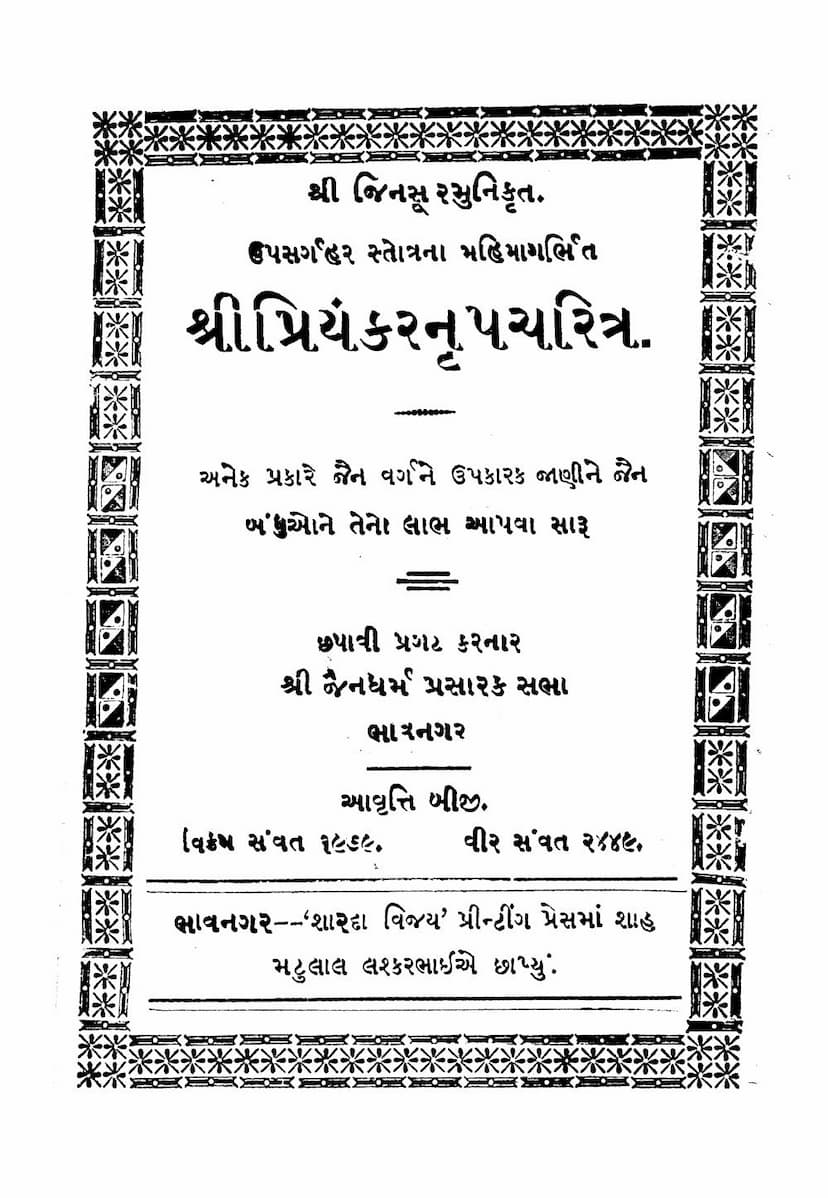Priyankar Nrup Charitra
Added to library: September 2, 2025

Summary
Here's a comprehensive summary of the Jain text "Priyankar Nrup Charitra" in English, based on the provided Gujarati text:
Book Title: Priyankar Nrup Charitra Author: Jinshurimuni (credited as the author of the original Sanskrit text) Publisher: Jain Dharm Prasarak Sabha, Bhavnagar Catalog Link: https://jainqq.org/explore/032369/1
Summary:
The "Priyankar Nrup Charitra" is a Jain narrative that recounts the life story of King Priyankar. The primary purpose of this text, as stated by the publisher Jain Dharm Prasarak Sabha, is to highlight the glory and efficacy of the "Upsargahar Stotra" (a devotional hymn dedicated to Lord Parshvanath) to the Jain community. The text is a Gujarati translation of an original Sanskrit prose work by Jinshurimuni.
Key Themes and Narrative Points:
-
The Power of the Upsargahar Stotra: The central theme of the story is the immense power and benefits derived from reciting and meditating upon the Upsargahar Stotra, attributed to Shrutakevali Shribhadra Bahu Swami. The text repeatedly emphasizes how this stotra brings prosperity, removes suffering, grants desirable boons, and even provides access to heavenly realms (like the underworld by Dharanendra). The stotra's efficacy is shown to be present at the beginning, middle, and end of the narrative, through the author's own words, a guru's advice, and finally, Priyankar's own experience. The recommended method of worship involves reciting it 500 times with concentration, incense, and lamps.
-
King Priyankar's Life and Virtues:
- Origin: The story begins in the city of Ashokpur in Magadh, ruled by King Ashokchandra. Priyankar is born to King Ashokchandra and his two queens, Ashomalata and Pushpamala. He is named Priyankar after a pleased deity.
- Character: Priyankar is described as a virtuous individual, possessing qualities like politeness, wisdom, good conduct, devotion to parents, teachers, and elders. He marries four times and has one son.
- Rise to Power: Despite being born a merchant's son (implied by the story of Pasdatt), Priyankar eventually attains kingship and rules justly.
- Religious Devotion: He actively practices Jain principles, performs religious rituals, and deeply respects gurus. His devotion to Lord Parshvanath and the Upsargahar Stotra is a recurring element throughout his life.
- Overcoming Adversity: Priyankar faces numerous challenges, including the theft of a valuable necklace (Devvallabh Haar), false accusations, and even imprisonment. He navigates these trials through his innate virtue, faith in the stotra, and sometimes divine intervention.
- Prosperity and Governance: He becomes a successful merchant and later a just king, bringing prosperity and well-being to his kingdom. The text highlights his fair administration and his eventual ascent to the heavens (Sadharmadev Lok).
-
Inclusion of Auxiliary Knowledge: The narrative also incorporates practical knowledge from various scriptures, such as:
- Astrology and Omens (Nimit-Shastra & Shakun-Shastra): The text details the interpretation of sneezes, the calls of animals, and other omens, influencing decisions and providing foresight.
- Architecture (Vastu-Shastra): Instructions on constructing houses, including the placement of rooms and auspicious materials, are mentioned.
- Dream Interpretation (Svapna-Shastra): The meaning of various dreams is explained, often portending future events.
-
Illustrative Episodes: The story features several significant events that underscore the themes:
- The Devvallabh Haar Incident: The disappearance and subsequent reappearance of a precious necklace, leading to suspicion and a test of character for Priyankar.
- The Wealthy Merchant Pasdatt: The story of Pasdatt, a devout Jain merchant who falls into poverty, his wife Priyashri's unwavering faith, and their eventual rediscovery of wealth through divine grace and virtuous actions. This part also highlights societal judgment based on wealth and the importance of perseverance in dharma.
- The Curse of the Yaksha: Priyankar's intervention to help Dhanadatt's household by placating a Yaksha through the Upsargahar Stotra, demonstrating his compassion and the stotra's power.
- The False Accusation and Divine Intervention: Priyankar is falsely accused of theft, leading to his imprisonment. A divine being (identified as the guardian deity of the region) intervenes, revealing the truth and facilitating his release and eventual kingship.
- The Prophecy and King Priyankar's Coronation: Through prophecies and divine manifestations, Priyankar is recognized as the rightful heir, and his coronation is described with great splendor.
- The Serpent Dharanendra and the Underworld: Priyankar's journey to the underworld with Dharanendra, showcasing the divine rewards of devotion.
- The Story of the Brahmins: An episode involving a deceitful Brahmin and a test of Priyankar's virtue and adherence to dharma, even when faced with false accusations.
- The Minister's Daughter's Affliction: Priyankar's compassionate act of healing the minister's daughter, afflicted by a demonic entity, through his devotion and the stotra.
- The King's Demise and Priyankar's Reign: The eventual death of King Ashokchandra and Priyankar's just and prosperous reign, marked by religious observance and public welfare. His later life includes performing meritorious deeds, undertaking pilgrimages, and renouncing the kingdom for spiritual pursuits.
-
The Upsargahar Stotra in Detail: The latter part of the text provides the actual verses of the Upsargahar Stotra in Prakrit and their Gujarati explanations, further emphasizing its importance. It describes how different verses have specific powers to overcome various afflictions and bring desired outcomes.
Overall Message:
The "Priyankar Nrup Charitra" serves as an exemplary tale for Jains, illustrating that unwavering devotion to Lord Parshvanath, particularly through the Upsargahar Stotra, can overcome all obstacles, lead to worldly prosperity, and ultimately contribute to spiritual liberation. The story emphasizes the virtues of righteousness, compassion, devotion, and perseverance in the face of adversity. It also reinforces the Jain belief in karma and the power of divine grace and spiritual practice.